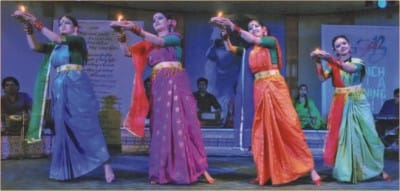Tagore's French Connection

Dancers perform at the programme.
“Tobu mone rekho jodi duure jai chole…” is a much-loved, soulful Rabindra Sangeet. But its charm multiplies manifold when you hear the bard rendering it himself in his stirring voice.
The French Gala Evening, organised by the France Bangladesh Chamber of Commerce and Industry (CCIFB) at Radisson Water Garden Hotel in Dhaka on Saturday evening, was where this number from the original archive, sent solely for the occasion, was played as part of the exclusive film of Tagore in France.
The event was split in two sessions -- “Tagore and France” was all about the poet's French connection, the history, literature and music while the second session featured “Riturango”, a cultural show on classical composition, recital, song and dance. It was indeed a rare opportunity to be able to listen to the great poet sing his own songs in the documentary film, “Tagore and France”, presented by Dr. Samuel Berthet, the Director of Alliance Française in Chittagong.
The relationship between Nobel laureate Rabindranath Tagore and France is of particular importance. It started with his grandfather Dwarkanath Tagore's visit to France and continued with his brothers, particularly Jyotirindranath.
Before his fame spread all over the world in 1913, the talent of Tagore had already attracted the attention of personalities such as the famous traveller Alexandra David Neel and the poet Saint John Terse, French ambassador to London.
His association with Romain Rolland paved the way for a historic, first-ever coordinated awakening and mobilisation of world intellectuals. Tagore became a regular visitor of La Maison Autour Monde, the house of famous businessman and patron of the arts Albert Kahn. In this house are kept invaluable archives of the poet and his family.
The first visiting professor invited to Visva Bharati was French scholar Sylvain Levi, in 1921, whose collaboration boosted Tagore's initiative of setting up a university. His relationship with France also played a pivotal role in the incarnation of the poet as a painter with his first ever exhibition held in Galerie Pigalle in 1939.
Tagore's attraction towards and influence on the French artists were immense and some of them rallied his educational experience in Shantiniketan, including French artists Alain Danielou and his companion, the Swiss photographer Raymond Burnier whose photos have been discovered in 2010 and exhibited for the first time in Chittagong and Dhaka this year and then taken to India and Europe.
“Riturango” or celebration of seasons, the second part of the programme, showcased some of the poet's best compositions -- songs, recitations and dances. The colourful and artistically choreographed cultural show paid tribute to the six seasons. In Shantiniketan, seasonal festival was first introduced by Tagore's younger son Shamindranath Tagore. Six-year-old Shami with his two friends staged Bashontotshab (spring festival) with a few songs from Tagore and some extracts from Bangla, English and Sanskrit literature. Certainly this made a deep impact on Tagore's mind and the second seasonal festival Borshamongol (blessings of the monsoon) was initiated by Tagore himself.
And in today's global context seasons are celebrated all over Bangladesh. These celebrations comprise not only compositions from Tagore but also those of the other eminent Bengali poets. The programme commenced with the song “Akash bhora shurjo tara”, describing the innate relationship between the cosmos and humans, between macrocosm and microcosm, the replication of the rhythm of the universe in the rhythm of heart.
“Riturango” was directed by Azizur Rahman Tuhin and choreographed by Tahmina Islam. Songs and recitation were rendered by Azizur Rahman Tuhin, Laisa Ahmed Lisa, Shemonti Manjou, Pabok Dipro and Naima Naz. And the graceful dances were presented by Tahmina Islam, Tarah Shahwar, Mrinmoy Rahman, Ajmee Jamal and Sraboni Chanda.
CCIFB is the country's oldest foreign chamber with 120 members. This year marks the 15th consecutive time that it has organised such an event.
SS Kamal, the president of the Chamber, said in his brief speech, “The chamber this year celebrates the 150th birth anniversary of the Nobel laureate and highlights Tagore's French connection.” Kamal added that the Chamber, along with facilitating business and organising trade fairs, actively takes part in cultural exchange between the two countries. The annual French Gala Event has earned its own reputation in this regard.
The French Ambassador, the chief patron of the Chamber, pointed out that Bangladesh has an economy with considerable potential even during this worldwide economic recession. Its vibrant private sector proved that challenges can be changed into success. Bangladesh enjoys a robust trade index with France.
The evening was a chic affair that reminded us that Tagore had left behind a legacy of 'intellectuality and high spirituality'. The programme was sponsored by T.K. Chemical Complex (gold sponsor), and AEI-English Electric of Bangladesh ltd, Legrand, Lafarge Surma Cement Ltd, Square Pharmaceuticals Ltd (silver sponsors). The bronze sponsors were Bureau Veritas (bivac) Bangladesh Ltd, ECM group and Knit Concern Ltd while the support sponsors were Aamra and Total.

 For all latest news, follow The Daily Star's Google News channel.
For all latest news, follow The Daily Star's Google News channel. 



Comments